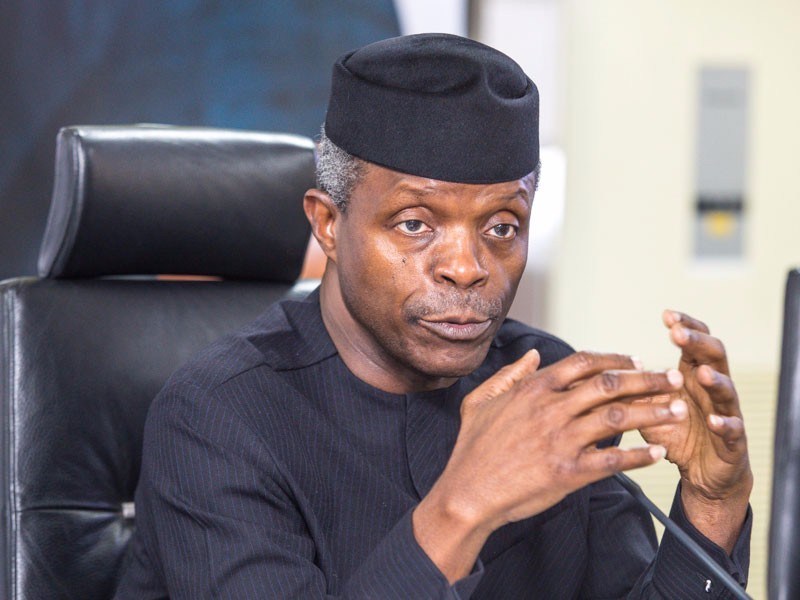Vice President Yemi Osinbajo has said that Nigeria requires about $1 trillion investment to modernise its energy infrastructure.
Osinbajo, who stated this stated this while declaring open the National Energy and Climate Change summit at the Old Banquet Hall, Presidential Villa, in Abuja Thursday, said government was doing a lot to attract both domestic and foreign-direct investment into the energy sector.
He added that the nation’s energy and energy-related policies were not only geared towards energy supply security but to also mitigate global warming.
While commending the Energy Commission of Nigeria, ECN, and the Federal Ministry of Science and Technology, FMST, for organizing the summit, Prof. Osinbajo, who was represented by the Minister of Science and Technology, Dr. Ogbonnaya Onu, said government had increased transparency and openness in governance to support private investment.
He said: “This important event will provide a high-level forum to discuss energy and climate change as they relate to economic development and environmental protection.
“I am happy that this summit is taking place at a time the Federal Ministry of Science and Technology, FMST, is working hard to help move our economy away from being resource-based to an economy that is knowledge-based and innovation-driven.
“I am hopeful that at the end of your deliberations, you will be able to provide solutions towards improving sustainable energy supply and access in the country.
”I am happy that the International Energy Charter, IECh, a reputable inter-governmental energy organization that has the main objective of promoting multi-lateral framework for cross-border cooperation in the field of energy development is here with us.
“I recall the ceremony last year in this same hall, when the Minister of Science and Technology signed on behalf of Nigeria the International Energy Charter political declaration after obtaining the approval of the President.
“Nigeria then joined the International Energy Charter, IECh, as an observer member state. I also recall that the Energy Commission of Nigeria immediately signed a Memorandum of Understanding, MoU, with the IECh Secretariat in order to promote such activities that will be beneficial to our dear country.
“Following this, a study of the Energy Investment Risk Assessment, EIRA, for Nigeria has been completed. The report has just been presented to us. I am happy that the assessment, which featured four performance indicators, has scored our energy investment risks as moderate.
“This is challenging, in view of the huge investment of about one trillion US dollars required to modernize our energy infrastructure in twenty-nine years, between 2014 and 2043.
“The government is doing a lot to attract both domestic and foreign-direct investment into the energy sector.
“Our energy and energy-related policies are not only geared towards energy supply security but to also mitigate global warming. Our nationally determined contributions, NDCs, to the Paris Climate Protocol are robust.
“To further support private investment, we have increased transparency and openness in governance, instituted several executive orders to remove bottlenecks in business registration and permits, etc.
“We are convinced that this will help us create more jobs, create additional wealth and reduce poverty in our country. We will like foreign investors to work with local investors and professionals in line with the Presidential Executive Order No. 5.
“We sincerely appreciate the effort and expertise put in by the lECh to get the report presented today. We look forward to greater areas of cooperation as we gear up towards accession to the Energy Treaty.
“It is my hope tha stakeholders would study the report, and come up with recommendations that will enhance the investment climate in our energy sector.
“I am confident that this would guarantee adequate, reliable, cost-effective and environmentally acceptable energy supply for a diversified economy as articulated in the Economic Recovery and Growth Plan, ERGP.”
In his address, Prof. Eli Jidere Bala, the Director-General/ Chief Executive Officer of Energy Commission of Nigeria, ECN said in line with its mandate, ECN instituted the summit to serve as a forum where national issues on energy in all its ramifications were discussed, with a view to facilitating the monitoring and assessment of performance of the energy sector in the execution of government policies on energy.
In his special remarks, the European Union head of Cooperation to Nigeria and ECOWAS, Kurt Cornelis, said the EU had so far committed 150 euros to support Nigeria through several projects cutting across the electricity value chain of the Nigeria electricity sector as well as the off-grid sector.
He said: “Just to mention a few, the EU from this envelope, is co-financing phase 2 of NESP with 20million euros as well as a support to TCN with 25 miliion euros grant to construct the Kura-Jogana-Gwiwa-Daura-Katsina double circuit 330KVA transmission line and substations which will also help evacuate the 1000MW Jigawa solar city project.”
He also stated that the focus of the EU was to increase support to Nigeria’s Climate Change initiatives by working hand in hand with the Federal Ministry of Environment on a new change action to start next year and continue to sensitise and raise awareness at the highest levels about the need take concrete measures to fight climate change.
He commended the Federal Government for having the political will to promote the use of renewable energy technology in the overall energy mix of the country and promised the continued support of the EU and ECOWAS to the country in ensuring that those without energy access got connected in the shortest possible time.

